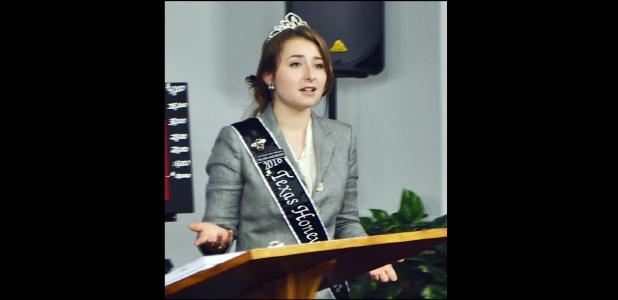Texas Honey Princess visits Cove
Fri, 2016-06-24 05:00
News Staff
By LYNETTE SOWELL
Cove Leader-Press
Willow Lanchester, the 2016 Texas Honey Princess, paid a visit to Copperas Cove on Thursday night when she attended the Bell and Coryell County Beekeepers meeting at Trinity Worship Center.
Lanchester, along with the Texas Honey Queen Hope Petition, travels throughout Texas speaking about the Texas beekeeping industry. The two are proponents of the Real Texas Honey initiative.
“One of the things I’ve done this year, is I’ve had to read all of the bee laws,” Lanchester said. “So learning about the Real Texas Honey initiative is something the Texas Beekeepers Association is doing to help beekeepers on all levels.”
The Real Texas Honey initiative, Lanchester told the beekeepers, is designed to help beekeepers like them, some of whom sell their honey locally which used to be illegal unless bottled in a commercial kitchen. Cottage industry beekeepers may now sell without a commercial kitchen if they produce less than 2,500 pounds of honey per year.
“It’s a marketing tool for beekeepers, and provides web sites where consumers can find local beekeepers in their area and they can buy from local beekeepers,” Lanchester added. Those beekeepers who are part of the Texas Beekeepers Association can be added to the online list.
Lanchester said the site also helps educate consumers about finding the best quality, local raw honey.
Her talk also focused on food fraud, which takes place when imported honey, often imported from China or India, which is illegal, makes its way to the United States.
Lanchester also discussed food fraud and how it hurts not only the beekeepers but consumers.
“There is no statutory definition of food fraud, but it’s generally agreed that it’s the intentional misrepresentation of a food product.” Lanchester suggested that one way to avoid food fraud is for consumers to get to know their suppliers, such as via Real Texas Honey.
As far as imported honey goes, Lanchester said it’s estimated that 70 percent of the honey consumed in the United States is imported from all over the world, to include South American countries and Australia. It is illegal to import honey from India and China because those countries, Lanchester said, actually have been found to solder their drums with heavy metals such as lead.
“Heavy metal has been found in the honey, along with chemicals and antibiotics the bees are treated with. This all ends up in the honey.”
She said that about 30 percent of the honey imported still ends up coming from china, that countries like china have worked around the law by selling their honey to another county where it’s legal, and then that honey will then be relabeled and sold in the United States as “safe.”
Lanchester gave an example of when some Chinese companies were labeling their honey as Russian honey, and “a bunch of people went to jail over that,” to include some American, German and Russian citizens. She said Sue Bee Honey, one of the biggest honey packers in America, has had some honey which originated in China.
A sophomore in college, Lanchester also gave a presentation that stemmed from her art studies about the honey bee in ancient Egypt as reflected in its art and culture.
Dennis Herbert, leader of the group, said Lanchester also spoke at the Rotary Club in Copperas Cove and was due to visit a group in Harker Heights before continuing on her local tour.
Lanchester is a sophomore in college and began beekeeping through the East Texas Beekeepers Association Youth Scholarship program. In addition to beekeeping, Willow is a budding artist in painting, graphite, charcoal, and collage.
The Bell and Coryell County Beekeepers meet at 7 p.m. the third Thursday of every month at Trinity Worship Center in Copperas Cove.
For more information about local honey, visit www.texasbeekeepers.org.

